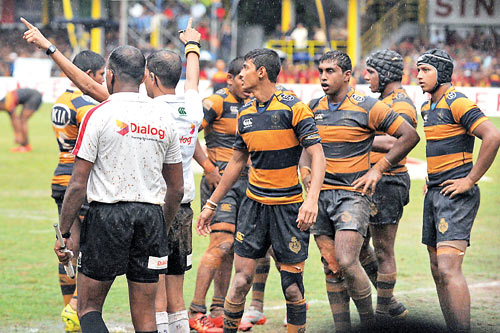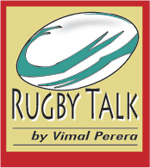Are TMOs really needed?
View(s): Do we need a TMO (Television Match Official) or a timekeeper was a question that was tossed to me. At first I decided to leave it alone as their seemed to be little truth in it. Thinking about it I thought may there could be some truth in it. The answer more appropriate was that we don’t need either of them. The Principal of Lalith Athulathmudali Maha Vidyalaya (LA), a school that is not in the bigger league of blue rib-band top ten rugby schools, spoke aloud being an example to others who are expected to set the benchmark. At a meeting the Schools Section and the SLRFU had with school masters, coaches as well as members of advisory bodies, it was emphasised that violence against match officials will not be tolerated and that severe action will be taken against the bench if they behave badly.
Do we need a TMO (Television Match Official) or a timekeeper was a question that was tossed to me. At first I decided to leave it alone as their seemed to be little truth in it. Thinking about it I thought may there could be some truth in it. The answer more appropriate was that we don’t need either of them. The Principal of Lalith Athulathmudali Maha Vidyalaya (LA), a school that is not in the bigger league of blue rib-band top ten rugby schools, spoke aloud being an example to others who are expected to set the benchmark. At a meeting the Schools Section and the SLRFU had with school masters, coaches as well as members of advisory bodies, it was emphasised that violence against match officials will not be tolerated and that severe action will be taken against the bench if they behave badly.
Probably the lesser known schools are taking a cue from the behaviour of the big brothers. The LA school has had good teams in the recent past but has been unable to sustain as players leave for better pastures. In this issue the principal has said that if a player wants to leave and join a school which gives better rugby opportunities he will release them as it is for their betterment. When many schools were more interested in the small things of rugby and wanting to be in a position to ask match officials to explain their decisions this Principal could not agree. He emphasised that this was a game and some lose and others win. The children must be taught to accept the win as well as a defeat. To him that was important and that was how rugby is expected to add value to a student.
 Why do you want to question and ask match officials about the decisions which should be over after the match. To him it was the student that matters most and not those who earn of those who spend this message, I am told, went well with the majority accept those who think they own rugby. There is hope is what a school master opined when he spoke to me. As at this time we have used the TMO in two schools games while there has been controversy on the time more often by the losing side. What is that these to support aspects can do enhance rugby and value to the game in schools? The supporters of the system of TMO by their thinking assume that this will detect mistakes of a referee. What they need to understand is that the TMO is a tool to help referees and assistant referees.
Why do you want to question and ask match officials about the decisions which should be over after the match. To him it was the student that matters most and not those who earn of those who spend this message, I am told, went well with the majority accept those who think they own rugby. There is hope is what a school master opined when he spoke to me. As at this time we have used the TMO in two schools games while there has been controversy on the time more often by the losing side. What is that these to support aspects can do enhance rugby and value to the game in schools? The supporters of the system of TMO by their thinking assume that this will detect mistakes of a referee. What they need to understand is that the TMO is a tool to help referees and assistant referees.
The referee is not expected to be subservient to the system. The referee is responsible for managing the TMO process. The referee is the decision-maker and will remain in charge of the game. The application of the TMO system has to be credible and consistent, protecting the image of the game. The question of a timekeeper again arises from the suspect mentality that exists in the mind of the people. This as I explained last week is a result of looking from the shoes your foot is in. In most cases it is a must-win if not find reasons why it went wrong. The mentality is seen at every match when the players have to queue for the credentials to be checked. Why does have to happen when we should play a game and built honesty and trust among schools children. It is because of the loss of values which will be exploited to field a non-eligible player.
The value I talk here is not about winning but about the lessons you teach and the contribution to build a better citizen to society. Then when we talk of the money earned by some and the money spent the value and systems fly out of the window. If you were to look at the game as an educator and a tool to build character we don’t need a TMO or a timekeeper. After all this is a game. It is heartening to note that the Ministry of Education has shown and interest to find out and look for reasons of misbehavior in some school rugby matches played recently. In most cases the deviant behavior is the result of adults not showing that they have grown beyond the schools days. It is also a matter of concern that one person who is identified as a perpetrator of violence on match officials after a recent school match is alleged to be a principal of a private educational institute.
If that is true what can you expect form the rest? In another incident in a lower division match, players assaulted the players of the opposing team. This is the first of players being involved. The forerunner I believe is a previous incident I witnessed when a parent challenged the opponents after a match. An incident that went unchecked which possibly leads to players taking the upper hand. In another incident I noticed was when a referee ordered an Assistant Coach off the playing area in a Plate match for abusive comments. The offender was refusing to leave and was defying the referee. The referee then used the communication channel through the captain who was asked to tell the coach to leave the field or else the match would be stopped. There is a cost to having a TMO which even in top rugby playing nations are applied only for bigger games where the cost is borne by sponsors. If not, they believe the hue cost can be better used to develop the game.
* Vimal Perera is a former player, coach, referee and an IRB Accredited Referees’ Educator


